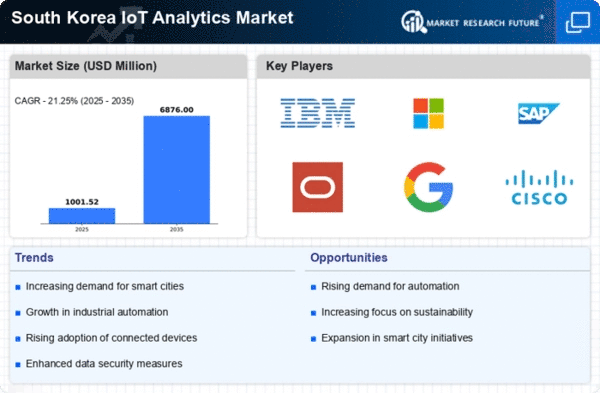Growth of Industrial IoT
The industrial sector in South Korea is experiencing a transformation through the adoption of IoT technologies, which is driving the iot analytics market. With industries increasingly leveraging connected devices for monitoring and automation, the need for sophisticated analytics to interpret data is becoming apparent. Reports suggest that the industrial IoT market in South Korea could reach $10 billion by 2026, highlighting the potential for analytics solutions to enhance operational efficiency and predictive maintenance. As manufacturers seek to optimize production processes and reduce downtime, the demand for analytics tools that can provide actionable insights from IoT data is likely to surge, thereby fostering growth in the iot analytics market.
Expansion of Smart Cities
The ongoing development of smart cities in South Korea is a pivotal driver for the iot analytics market. As urban areas increasingly adopt IoT technologies to enhance infrastructure and services, the demand for analytics solutions rises. In 2025, the South Korean government aims to invest approximately $1 billion in smart city initiatives, which will likely necessitate advanced analytics to process vast amounts of data generated by connected devices. This investment is expected to create a robust ecosystem for IoT applications, thereby propelling the growth of the iot analytics market. Furthermore, the integration of real-time data analytics into urban management systems can optimize traffic flow, energy consumption, and public safety, indicating a significant opportunity for analytics providers in this sector.
Emphasis on Energy Efficiency
The growing focus on energy efficiency in South Korea is a crucial driver for the iot analytics market. As the nation aims to reduce carbon emissions and promote sustainable practices, IoT technologies are being deployed to monitor and optimize energy consumption. The South Korean government has set ambitious targets to decrease energy usage by 20% by 2030, which necessitates the use of analytics to track and analyze energy data. This trend indicates a rising demand for analytics solutions that can provide insights into energy usage patterns and identify areas for improvement. Consequently, the iot analytics market is likely to expand as organizations seek to implement data-driven strategies for energy management.
Rising Adoption of Cloud Computing
The shift towards cloud computing in South Korea is significantly influencing the iot analytics market. As businesses increasingly migrate their operations to the cloud, the need for scalable and flexible analytics solutions becomes essential. Cloud-based analytics platforms allow organizations to process and analyze large volumes of IoT data efficiently. In 2025, it is estimated that over 70% of South Korean enterprises will utilize cloud services, which could lead to a substantial increase in the demand for cloud-based analytics tools. This trend suggests that the iot analytics market will benefit from enhanced accessibility and cost-effectiveness, enabling companies to derive insights from their IoT data without the burden of extensive on-premises infrastructure.
Increased Focus on Healthcare Innovations
The healthcare sector in South Korea is undergoing a transformation driven by IoT innovations, which is positively impacting the iot analytics market. With the rise of telemedicine and remote patient monitoring, healthcare providers are increasingly relying on IoT devices to collect patient data. This influx of data necessitates advanced analytics to derive meaningful insights for improving patient outcomes. The South Korean government has allocated approximately $500 million for healthcare technology advancements in 2025, indicating a strong commitment to integrating IoT solutions. As healthcare organizations seek to enhance operational efficiency and patient care through data analytics, the iot analytics market is poised for significant growth in this sector.
















